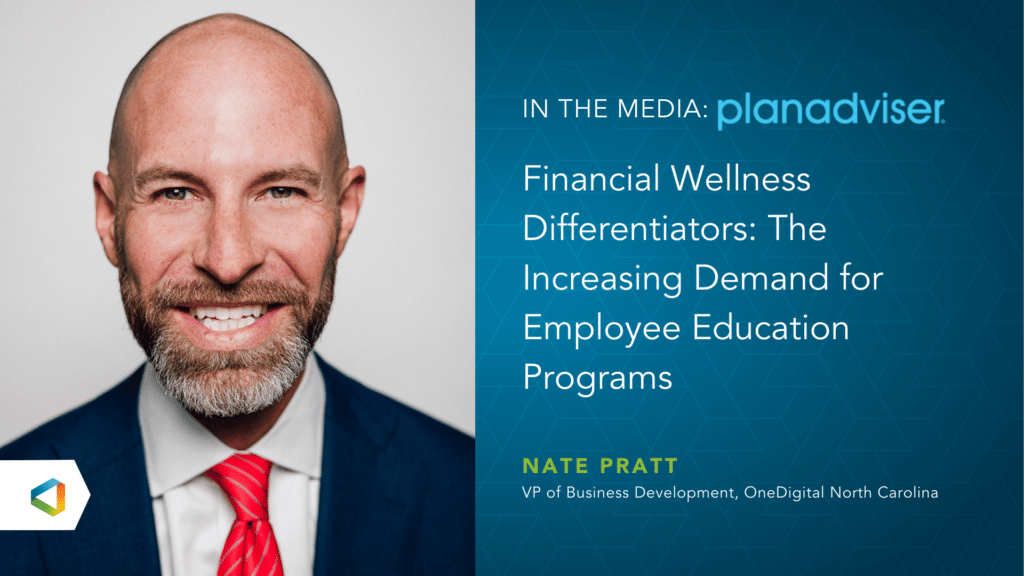Better Benefits, Healthy People
How Financial Planning Can Help Overcome Stress
How Financial Planning Can Help Overcome Stress
No matter what stage of life your employees are in, they are certainly thinking about their finances and financial future.
While it used to be a faux pas to think about—let alone speak with an employee about their financial life—in today’s job market, it’s the employer's responsibility to have those conversations and give employees the proper resources to start their financial planning journey.
A recent survey conducted for OneDigital shows that almost all employees want their employer to provide financial education and advisory services. Simply offering a retirement program, like a traditional 401(k) with a match, isn’t going to cut it in today’s competitive landscape. Financial benefits should be customized, strategic, and effective—driven by a holistic approach that involves all employee benefits.
The High Cost of Financial Stress
The connection between employee financial stress and a business’s performance has never been more clear. According to the American Psychological Association’s (APA) 2022 Stress in America Survey, finance-related stress is at the highest level recorded since 2015, with 83 percent of people making money and inflation as key stressors.
Likewise, the APA study found that nearly two in five adults reported that they can’t bring themselves to do anything when stressed. With this level of stress, employers not only risk losing millions of dollars in productivity each year but also risk losing qualified employees (who are worth their weight in gold) to boot.
On the other hand, reports continue to show that organizations that prioritize employee engagement and well-being experience up to a 21 percent increase in profitability due to higher retention rates and lower absenteeism.
Getting the Right Mental Mindset
Getting started is one of the biggest hurdles when it comes to financial planning. Unfortunately, the misconception that it’s too difficult and daunting is common.
Here are a few thoughts about the power of financial planning and some tips for organizations that are looking to help empower their employees on their financial wellbeing journeys:
Get rid of uncertainty. Uncertainty leads to negativity and worrying and is a primary driver of stress. You'll feel better by thoroughly planning and seeing it through from start to finish. The plan may not tell you what you want to hear, but you’ll feel better simply because of the clarity a plan will bring and the positive action plan that will come from it.
Start with a reasonable goal and build from there. Not sure where to start? Start with the end in mind, even if it's seemingly insignificant. Don’t have a budget? Create one! Use a budget calculator to understand where your money is going. Based on what you learn from your budget, set your next goal, and so on. Goals-based financial planning allows you to take control of your financial future.
Believe it before you can achieve it. It’s important to tune out all negative or anxious noise and focus on the plan and the final destination. That's the beauty of having a plan in place—you're focused on the numbers, data, and actionable steps to stay on course with what you're trying to accomplish.
Hold yourself accountable. A study by the American Society of Training and Development found that people are 65 percent more likely to reach a goal after communicating it to another person. Setting milestones and being responsible for your progress—whether through a planner or someone you can confide in—will help you stay on track.
The Importance of Having a Financial Plan
A financial plan instills confidence and reduces financial stress by clearly understanding one's financial situation. It also highlights areas where adjustments can be made, enabling individuals to make informed decisions about their spending, saving, and investing habits.
Creating Your Plan:
- Set your financial goals: Clearly define your short-term (1-3 years), mid-term (3-5 years), and long-term (5+ years) financial goals. These could include saving for a down payment on a house, paying off debt, building an emergency fund, or planning for retirement.
- Gather your financial information: Collect all relevant documents, such as bank statements, investment accounts, pay stubs, and debt statements. This will provide a comprehensive overview of your current financial standing.
- Create a budget: Track your income and expenses to understand where your money is going. Identify areas where you can reduce spending and allocate more towards savings or debt repayment.
- Develop a debt management plan: Prioritize paying off high-interest debt, such as credit cards, to reduce your overall debt burden. Consider debt consolidation or balance transfer options if applicable.
- Build an emergency fund: Set aside 3-6 months' worth of living expenses in an easily accessible account to cover unexpected emergencies.
- Invest for your future: Start investing early to grow your wealth over time. Consider contributing to employer-sponsored retirement plans, such as a 401(k), and explore individual investment options like mutual funds or ETFs.
- Protect your assets: Consider adequate insurance coverage, such as health, life, and disability insurance, to protect yourself and your family from financial hardship in case of unforeseen events.
- Review and adjust your financial plan regularly: As your financial situation and goals evolve, revisit your plan annually or whenever significant life changes occur. Make adjustments to ensure your plan remains aligned with your objectives.
Addressing the financial stresses impacting your teams isn’t just critical for supporting employee well-being and productivity. It can affect an organization’s ability to retain talent, curb absenteeism, reduce workforce disengagement, and increase long-term profitability.
OneDigital's goal is to help your employees live without financial burden. Learn about plan features that you should look to implement in your plan today.
Investment advice offered through OneDigital Investment Advisors LLC, an SEC-registered investment adviser and wholly owned subsidiary of OneDigital.




